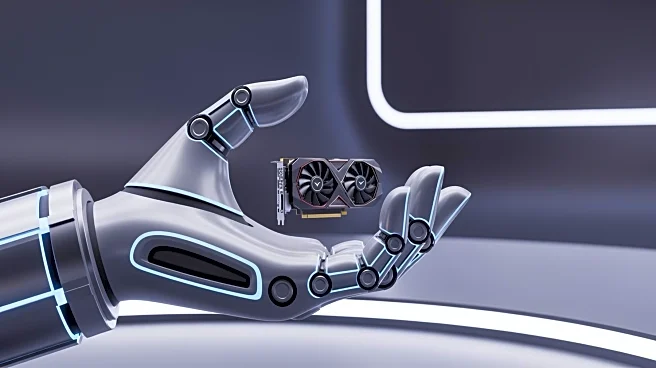What's Happening?
The Minisforum MS-R1, a compact PC featuring an Arm chip and a full-sized x16 PCIe graphics slot, has been introduced, potentially signaling a shift in gaming hardware. This development comes amid predictions
of a move away from traditional x86 PC processors towards more efficient Arm chips. The MS-R1 runs on a Cixin P1 CPU, a Chinese-made chip with eight Cortex A720 performance cores and four Cortex A520 efficiency cores. Despite its compact design, the MS-R1's graphics slot is limited to eight PCIe Gen 4 lanes, which may not support high-end GPUs like the RTX 5090. Software support remains a challenge, as neither Nvidia nor AMD currently provide GPU drivers for Windows on Arm, making Windows gaming on Arm a nonstarter for now.
Why It's Important?
The introduction of Arm-powered PCs with discrete graphics card support could represent a significant shift in the gaming industry, potentially leading to more efficient and compact gaming systems. This development could impact hardware manufacturers, software developers, and gamers, as it may drive innovation in gaming technology and influence future hardware design. The potential for Arm chips to become a viable option for gaming PCs could also affect the competitive landscape among chip manufacturers, with companies like Nvidia and AMD needing to adapt their strategies to accommodate this shift.
What's Next?
The future of gaming on Arm-powered PCs will depend on the development of compatible software and drivers. If Nvidia and AMD release Arm drivers for Windows, it could open up new possibilities for gaming on these systems. The industry will likely watch closely for any announcements regarding Arm chip support from major hardware manufacturers, as this could influence the direction of gaming technology development.
Beyond the Headlines
The shift towards Arm-powered PCs raises questions about the long-term sustainability and efficiency of gaming hardware. As the industry explores new technologies, considerations around energy consumption, cost-effectiveness, and environmental impact will become increasingly important. Additionally, the cultural implications of transitioning to new hardware platforms may affect consumer preferences and expectations.









